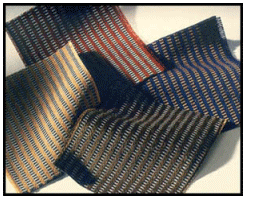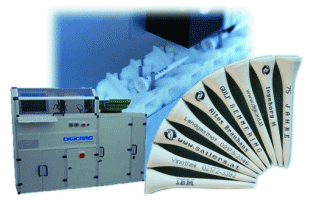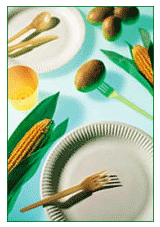Sustainable Design Awards Toolkit
Section 4.3 - Alternative materials in products
 One way of improving a product's sustainability is to consider
alternative, more environmentally considerate, materials when
looking at material selection. William McDonough have developed
a fabric called 'DesignTex' which has been reworked from the
standard dyed synthetic material (which can be very toxic containing
the likes of cadmium and giving off chemical gasses). 'DesignTex'
now use sustainably grown natural wool and ramie fibers and
low environmental impact dyes that are non carcinogenic, non
toxic and include no heavy metals. Any scrap left over is used
as non toxic compostable felt and used to insulate crops - it
soon decomposes and nourishes the earth.
One way of improving a product's sustainability is to consider
alternative, more environmentally considerate, materials when
looking at material selection. William McDonough have developed
a fabric called 'DesignTex' which has been reworked from the
standard dyed synthetic material (which can be very toxic containing
the likes of cadmium and giving off chemical gasses). 'DesignTex'
now use sustainably grown natural wool and ramie fibers and
low environmental impact dyes that are non carcinogenic, non
toxic and include no heavy metals. Any scrap left over is used
as non toxic compostable felt and used to insulate crops - it
soon decomposes and nourishes the earth.
'Climatex' are another company that have explored these methods
also using organic wool and ramie fabric. 38 of the dyes they
now employ are totally safe. Their aim is the same, to substitute
toxic components with safer ones.
Various
work is currently being undertaken into alternative materials
to the ones in place today. One of the problems faced is that
the majority of plastics cannot be broken down by bacteria and
is burnt release poisonous gases, in other words they are non-biodegradable.
Belgium based ecological company Ecover (www.ecover.com)
have developed a wide range of environmentally friendly products,
including biodegradable plastic bags that decompose by bacteria
when buried in soil. They have not been introduced worldwide
as yet but it's a start.
|
| � |
� |
|
More information about Ecover can be found on their website:
www.ecover.com
|
| � |
Biopolymers seem to be a distinct possibility for incorporation
into future products that we may consider as sustainable, despite
issues surrounding shelf life. Biopolymers are non-toxic and
biodegradable polymers that have been generated from renewable
natural resources. They can be produced using biological systems
and also chemically synthesized biological starting materials.
Biopolymers, which are starch-based, can be seen as an alternative
to petroleum-based polymers as they allow for enhanced environmental
properties. Current Biopolymers also come with various lifespans
from a few weeks to a few months - this is where shelf life
considerations are very important. |
| � |
� |
|
The 'Vision Engineer' website covers a range of technology advances
related to such products as those produced by 'Ecover', it can be found at:
www.visionengineer.com
|
| � |
� |
|
|
Co-operative Bank and Greenpeace
have teamed up and taken steps to include more sustainability
in a field perhaps often overlooked as an area where improvements
could be made. Standard credit and debit cards are usually made
from PVC, and in manufacture & incineration release dioxins
into the environment. To overcome this, a Greenpeace card has
been introduced mainly made from Biopol (an innovative, biodegradable
plastic based on fermentation of sugar rather than fossil fuels).
They are currently working on a long term totally PVC free card
that includes the magnetic strip not covered in the current
design.
The website for this product can be found at:
www.co-operativebank.co.uk/personal/personal_greenpeace.html
|
| � |
� |

|
Companies have started producing products not only to work from an environmental
stance but also to work for themselves as a
businessopportunity, identifying a niche in the market. One company 'Bio
Golf Tees' (www.bio-golf-tee.com) are producing biodegradable golf
tees that biodegrade within weeks of use if left in the ground, which
is a common drawback among standard tees. They are billed by 'Bio Golf
Tees' as a product that is 'dedicated to the maintenance, upkeep and
conservation of
golf courses'. They are moulded from a unique polytriticum of wheat resins and polymers that can be produced and
used locally. The product and its marketing shows an angle that could
be used to introduce more sustainable products that are not only of
benefit to the user in the short term but also in the long term.
|
| � |
� |
|
|
Novamont (www.materbi.com)
are developing exciting new biodegradable polymers called 'Mater-Bi'.
As well as being biodegradable it's recyclable, compostable
and can be used as conventional plastics. They can also be coloured
with natural pigments of biodegradable master batches.
Originating from the Umbria region in Italy where the production
capacity is 8,000 ton per year, they can be applied to a range
of products including: napkins, cutlery like that used in McDonalds,
packaging, bags, toys and stationery.
|
|
|
 
 |
Inspirational Current Work
|
 |
�
|
 |
Toolkit Index


|
|

